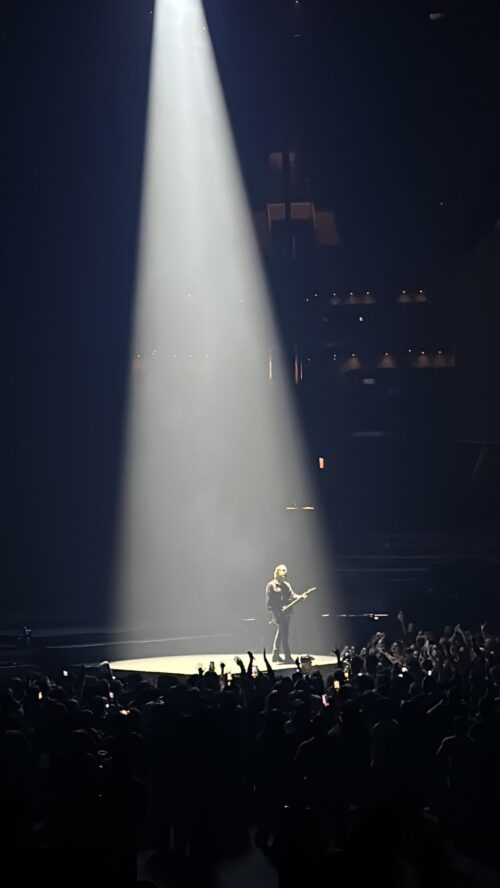Angst, ardor, and a lot of haze filled Boston’s TD Garden last Wednesday. On Sept. 4, the world tour of dream pop band Cigarettes After Sex made a stop at the iconic venue. By 8 p.m., concertgoers clad mostly in black made their way into the arena to fill the nearly 20,000-seat venue.
The show needed no opening act. At exactly 9 p.m., the lights dimmed and the first muddled chords of X’s, the titular song of both the arena tour and the band’s latest album, rang out into the stadium’s large open air. A dim spotlight lit up the face of Greg Gonzales, the lead singer and founder of the band. Even dimmer spotlights revealed the silhouettes of bassist Randy Miller and drummer Jacob Tomsky off to either side of Gonzales.
As Gonzales began singing the sleepy, low lyrics of X’s, both the lighting and position of every band member remained stagnant. Despite slight variations in lighting, movement, and projections, the concert continued this way—multiple songs blended into one long time warp of a sensual, sad lullaby. While many songs sounded quite familiar—the band’s most popular songs, like Apocalypse, stood out with a little more energy and emotion from the audience.
The concert was entirely black and white—in lighting, tonality, the band’s attire, and photography policy—matching Cigarettes After Sex’s iconic black and white album cover art. The only occasional color came from the warm glow of Gonzales’ face when hit with a brighter white light. The excessive black and white of the production design, albeit faithful to the band’s branding, somehow seemed to also drain any hint of color from the music itself. This transported the listener to a familiar setting, perhaps reminiscent of where they first heard Cigarettes After Sex—laying in their dark bedroom or sitting in their car with fogged-up windows, parked in some sketchy corner of suburbia.
Cigarettes After Sex’s music and brand reeks of the agony of adolescence. A raunchy, rebellious allure exists in the band name alone, and their songs provide melancholic, amorous lyricism to match. The limited range and similar composition of their music intensifies this dreamlike quality. The show did a decent job of expressing this melancholy, but this did not save the show from a major issue—there was a significant incongruity between Cigarettes After Sex’s intimate music and the large, airy venue of TD Garden.
The discordance between the languorous sound and the vastness of a stadium venue was not just distracting, but it also undermined the music’s impact. Haze effects dissipated halfway up the stadium. Large expanses of floor and peripherally lit stadium entrances pulled focus from the band. The monochrome projections behind the band, ranging from burning flowers to snowstorms, felt too slow and too dim, failing to draw the audience’s attention to the stage.
Moreover, the band did not seem to make much of an effort to assert itself. Miller and Tomsky remained in such muted light for almost the entire show that they seemed to be only silhouettes, just barely-there dreamlike figures. Perhaps in an effort to maintain a semblance of intimacy, the band purposefully made themselves invisible, forgetting they were playing in a space so large. Next time, Cigarettes After Sex should pick a venue where the smoke will fill the room. Without it hanging thick in the air, their performance felt thin.
Despite these major issues, the strength of Gonzales’ vocals and the audience’s joyful energy made the concert enjoyable. Cigarette’s After Sex’s monotony did not detract from their impressive lyricism and vocals. They did do a decent job at creating a remarkably transcendent and atmospheric experience. Overall, the concert was still a calming, entertaining visual and auditory event.
As I walked out of the venue, I heard a maybe eighteen-year-old on the sidewalk cough out some cigarette smoke, saying something to the effect of: “We’re smoking a cigarette after Cigarettes After Sex!” with a particular euphoria that can only come from the thrill of teenage rebellion. I hope that their cigarette did not struggle to stay lit quite as much as the concert that came before it did.
Kayla Reifel ’26 (kaylareifel@college.harvard.edu) is the Arts Editor of the Independent.

